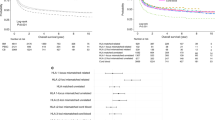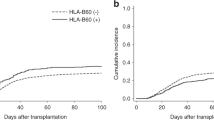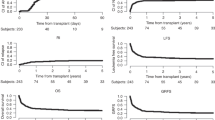Abstract
Graft failure remains a severe complication of hematopoietic stem cell transplantation (HSCT). Several risk factors have already been published. In this study, we re-evaluated them in a large cohort who had the benefit of the recent experience in HSCT (2006–2012). Data from 4684 unrelated donor HSCT from 2006 to 2012 were retrospectively collected from centers belonging to the French Society for Stem Cell Transplantation. Among the 2716 patients for whom HLA typing was available, 103 did not engraft leading to a low rate of no engraftment at 3.8%. In univariate analysis, only type of disease and status of disease at transplant for malignant diseases remained significant risk factors (P=0.04 and P<0.0001, respectively). In multivariate analysis, only status of disease was a significant risk factor (P<0.0001). Among the 61 patients who did not engraft and who were mismatched for 1 HLA class I and/or HLA-DP, 5 donor-specific antibodies (DSAs) were detected but only 1 was clearly involved in graft failure, for the others their role was more questionable. Second HSCT exhibited a protective although not statistically significant effect on OS (hazard ratio=0.57 [0.32–1.02]). In conclusion, only one parameter (disease status before graft) remains risk factor for graft failure in this recent cohort.
This is a preview of subscription content, access via your institution
Access options
Subscribe to this journal
Receive 12 print issues and online access
$259.00 per year
only $21.58 per issue
Buy this article
- Purchase on Springer Link
- Instant access to full article PDF
Prices may be subject to local taxes which are calculated during checkout

Similar content being viewed by others
References
Sasazuki T, Juji T, Morishima Y, Kinukawa N, Kashiwabara H, Inoko H et al. Effect of matching of class I HLA alleles on clinical outcome after transplantation of hematopoietic stem cells from an unrelated donor. Japan Marrow Donor Program. N Engl J Med 1998; 339: 1177–1185.
Weisdorf DJ, Anasetti C, Antin JH, Kernan NA, Kollman C, Snyder D et al. Allogeneic bone marrow transplantation for chronic myelogenous leukemia: comparative analysis of unrelated versus matched sibling donor transplantation. Blood 2002; 99: 1971–1977.
Kiehl MG, Kraut L, Schwerdtfeger R, Hertenstein B, Remberger M, Kroeger N et al. Outcome of allogeneic hematopoietic stem-cell transplantation in adult patients with acute lymphoblastic leukemia: no difference in related compared with unrelated transplant in first complete remission. J Clin Oncol 2004; 22: 2816–2825.
Davies SM, Kollman C, Anasetti C, Antin JH, Gajewski J, Casper JT et al. Engraftment and survival after unrelated-donor bone marrow transplantation: a report from the national marrow donor program. Blood 2000; 96: 4096–4102.
Lee SJ, Klein J, Haagenson M, Baxter-Lowe LA, Confer DL, Eapen M et al. High-resolution donor-recipient HLA matching contributes to the success of unrelated donor marrow transplantation. Blood 2007; 110: 4576–4583.
Rubinstein P, Carrier C, Scaradavou A, Kurtzberg J, Adamson J, Migliaccio AR et al. Outcomes among 562 recipients of placental-blood transplants from unrelated donors. N Engl J Med 1998; 339: 1565–1577.
Booth C, Veys P . T cell depletion in paediatric stem cell transplantation. Clin Exp Immunol 2013; 172: 139–147.
Champlin RE, Horowitz MM, van Bekkum DW, Camitta BM, Elfenbein GE, Gale RP et al. Graft failure following bone marrow transplantation for severe aplastic anemia: risk factors and treatment results. Blood 1989; 73: 606–613.
Rocha V, Gluckman E . Improving outcomes of cord blood transplantation: HLA matching, cell dose and other graft- and transplantation-related factors. Br J Haematol 2009; 147: 262–274.
Slavin S, Nagler A, Naparstek E, Kapelushnik Y, Aker M, Cividalli G et al. Nonmyeloablative stem cell transplantation and cell therapy as an alternative to conventional bone marrow transplantation with lethal cytoreduction for the treatment of malignant and nonmalignant hematologic diseases. Blood 1998; 91: 756–763.
Khouri IF, Keating M, Korbling M, Przepiorka D, Anderlini P, O'Brien S et al. Transplant-lite: induction of graft-versus-malignancy using fludarabine-based nonablative chemotherapy and allogeneic blood progenitor-cell transplantation as treatment for lymphoid malignancies. J Clin Oncol 1998; 16: 2817–2824.
Mantel N, Brown C, Byar DP . Tests for homogeneity of effect in an epidemiologic investigation. Am J Epidemiol 1977; 106: 125–129.
Gyger M, Baron C, Forest L, Lussier P, Lagace F, Bissonnette I et al. Quantitative assessment of hematopoietic chimerism after allogeneic bone marrow transplantation has predictive value for the occurrence of irreversible graft failure and graft-vs.-host disease. Exp Hematol 1998; 26: 426–434.
Hill RS, Petersen FB, Storb R, Appelbaum FR, Doney K, Dahlberg S et al. Mixed hematologic chimerism after allogeneic marrow transplantation for severe aplastic anemia is associated with a higher risk of graft rejection and a lessened incidence of acute graft-versus-host disease. Blood 1986; 67: 811–816.
Locatelli F . Improving cord blood transplantation in children. Br J Haematol 2009; 147: 217–226.
Kroger N, Zabelina T, Kruger W, Renges H, Stute N, Durken M et al. Anti-thymocyte-globulin as part of the preparative regimen prevents graft failure and severe graft versus host disease (GvHD) in allogeneic stem cell transplantation from unrelated donors. Ann Hematol 2001; 80: 209–215.
Spellman S, Bray R, Rosen-Bronson S, Haagenson M, Klein J, Flesch S et al. The detection of donor-directed, HLA-specific alloantibodies in recipients of unrelated hematopoietic cell transplantation is predictive of graft failure. Blood 2010; 115: 2704–2708.
Cutler C, Kim HT, Sun L, Sese D, Glotzbecker B, Armand P et al. Donor-specific anti-HLA antibodies predict outcome in double umbilical cord blood transplantation. Blood 2011; 118: 6691–6697.
Ruggeri A, Labopin M, Sormani MP, Sanz G, Sanz J, Volt F et al. Engraftment kinetics and graft failure after single umbilical cord blood transplantation using a myeloablative conditioning regimen. Haematologica 2014; 99: 1509–1515.
Takanashi M, Atsuta Y, Fujiwara K, Kodo H, Kai S, Sato H et al. The impact of anti-HLA antibodies on unrelated cord blood transplantations. Blood 2010; 116: 2839–2846.
Thaunat O, Hanf W, Dubois V, McGregor B, Perrat G, Chauvet C et al. Chronic humoral rejection mediated by anti-HLA-DP alloantibodies: insights into the role of epitope sharing in donor-specific and non-donor specific alloantibodies generation. Transpl Immunol 2009; 20: 209–211.
Vaidya S, Hilson B, Sheldon S, Cano P, Fernandez-Vina M . DP reactive antibody in a zero mismatch renal transplant pair. Hum Immunol 2007; 68: 947–949.
Goral S, Prak EL, Kearns J, Bloom RD, Pierce E, Doyle et al. Preformed donor-directed anti-HLA-DP antibodies may be an impediment to successful kidney transplantation. Nephrol Dial Transplant 2008; 23: 390–392.
Ciurea SO, Thall PF, Wang X, Wang SA, Hu Y, Cano P et al. Donor-specific anti-HLA Abs and graft failure in matched unrelated donor hematopoietic stem cell transplantation. Blood 2011; 118: 5957–5964.
Kedmi M, Resnick IB, Dray L, Aker M, Samuel S, Gesundheit B et al. A retrospective review of the outcome after second or subsequent allogeneic transplantation. Biol Blood Marrow Transplant 2009; 15: 483–489.
Acknowledgements
We would like to thank the members of the Société Française de Greffe de Moelle and de Thérapie cellulaire (SFGM-TC), the SFGM-TC data manager Nicole Raus and all collaborators who contributed to patient recruitment, data registration and quality control of the study. This work was supported by grant from IRGHET.
Author contributions
TC collected and analyzed data. TC and PL wrote the manuscript. KD and JL performed the statistical analysis and contributed to the redaction of the manuscript. NR sent data capture forms to the centers, collected clinical data from questionnaires and performed the extraction of clinical data. JLT performed HLA antibodies detection. RPdL and PL have been the supervisors of the study. RPdL, PL, JLT, KD, JL, NR, PvE, DC, PP, MF, IJ, VD, FD and CP read and commented on the manuscript.
Author information
Authors and Affiliations
Corresponding author
Ethics declarations
Competing interests
The authors declare no conflict of interest.
Additional information
Supplementary Information accompanies this paper on Bone Marrow Transplantation website
Supplementary information
Rights and permissions
About this article
Cite this article
Cluzeau, T., Lambert, J., Raus, N. et al. Risk factors and outcome of graft failure after HLA matched and mismatched unrelated donor hematopoietic stem cell transplantation: a study on behalf of SFGM-TC and SFHI. Bone Marrow Transplant 51, 687–691 (2016). https://doi.org/10.1038/bmt.2015.351
Received:
Revised:
Accepted:
Published:
Issue Date:
DOI: https://doi.org/10.1038/bmt.2015.351
This article is cited by
-
Allogenic hematopoietic stem cell transplantation outcomes of patients aged ≥ 55 years with acute myeloid leukemia or myelodysplastic syndromes in China: a retrospective study
Stem Cell Research & Therapy (2024)
-
Favorable outcomes following CD34-selected stem cell boost for poor graft function after allogeneic hematopoietic stem cell transplantation
Bone Marrow Transplantation (2024)
-
Long-term outcome of second allogeneic hematopoietic stem cell transplantation (HSCT2) for primary graft failure in patients with acute leukemia in remission: A study on behalf of the Acute Leukemia Working Party of the European Society for Blood and Marrow Transplantation
Bone Marrow Transplantation (2023)
-
Short treatment of peripheral blood cells product with Fas ligand using closed automated cell processing system significantly reduces immune cell reactivity of the graft in vitro and in vivo
Bone Marrow Transplantation (2022)
-
Non-relapse cytopenias following allogeneic stem cell transplantation, a case based review
Bone Marrow Transplantation (2022)



